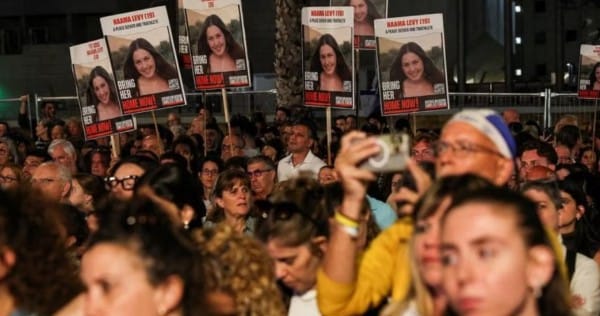AsiaOne

Source: AsiaOne
JERUSALEM -- Israel began toned down Independence Day celebrations at sundown on May 13, with hopes for an end to the seven-month-old Gaza war dim, anti-government protests growing and internal divisions festering.
As the country marks its 76th year, firework displays were cancelled and the traditional torch-lighting ceremony at the Jerusalem national cemetery will be taped for TV audiences instead of livestreamed.
Opposition lawmakers blasted the move as an attempt at stifling protest against Prime Minister Benjamin Netanyahu, who has come under attack at live events from hecklers furious about his failure to bring home the 128 hostages still held by Hamas in Gaza.
Simon Davidson, from the centrist Yesh Atid party, posted a video on the social media platform X, accusing Netanyahu's Transport Minister Miri Regev -- responsible for organising the torch-lighting ceremony -- of bypassing Israel's parliament, the Knesset, and using the event for political objectives.
"They don't give a damn about the Israeli Knesset, and that means they don't give a damn about Israeli citizens," he said on the video.
"They are doing a staged ceremony filled with everything they want to introduce politically and present to the country. No audience, no live broadcast, no committee that cares about this ceremony."
The war began when the Gaza-based Palestinian militant group Hamas burst into border communities in southern Israel on Oct 7, killing 1,200 people and taking more than 250 hostage, according to Israeli tallies.
Since then, a further 273 Israeli soldiers have died, mostly in an assault on Gaza that Palestinian medics say has killed more than 35,000 people.
"Although this is not a regular Independence Day, it is a special opportunity for us to realise the significance of our independence," Netanyahu said in comments pre-recorded for TV audiences.
Much public anger in Israel has focussed on the government of Netanyahu, a veteran conservative who continues to promote himself as guarantor of national security and who has stopped short of taking personal responsibility for the Oct 7 attacks.
Protests calling for Netanyahu and his government to resign and for a deal to bring back the hostages are gathering steam in Israel. A large anti-government protest, billed as an alternate Independence Day event and underscoring the country's deep political divide, was held May 13 evening in Tel Aviv.
"This year, Independence Day is not a holiday, and it's certainly not a happy one," said Chen Avigdori, whose wife and daughter were released from captivity in Gaza.
"Is there glory in a state that has abandoned its citizens and continues to abandon (its hostages) for 220 days now?"
A growing number of Israelis -- nearly 50 per cent -- support an end to the Gaza war in exchange for the release of hostages -- a view that was extremely rare in the weeks, if not months, following the Oct 7 attacks.
Independence Day in Israel is observed from sundown on May 13 to sundown on May 14, immediately after the more sombre Memorial Day, in which Israelis pay tribute to the country's war dead, as well as those of have fallen victim to terror attacks.
Israeli Independence Day marks the country's founding in 1948, in which the British partitioned historic Palestine into Arab and Jewish states.
Palestinians lament the war that followed as the "Nakba", or catastrophe, as some 700,000 of them fled or were driven from their homes. Israel contests the assertion that it forced out Palestinians.
